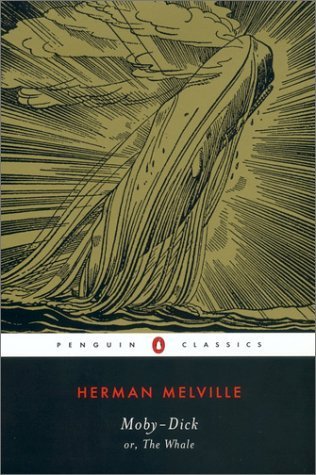

LISA: Dad, you can't take revenge on an animal. That's the whole point of Moby Dick.
HOMER: Oh Lisa, the point of Moby Dick is 'be yourself.'-- The Simpsons, Season 15, Episode 5, “The Fat and the Furriest”(Ahoy, Matey! Thar be spoilers ahead).There, there. Stop your crying. You didn’t like Herman Melville’s Moby Dick? You didn't even finish it? I’m here to tell you, that’s okay. You’re still a good person. You will still be invited to Thanksgiving dinner. You won’t be arrested, incarcerated, or exiled. You will not be shunned (except by English majors; they will shun you). Your family and friends will still love you (or at least stand you). Your dog will still be loyal (your cat, though, will remain indifferent).Moby Dick can be a humbling experience. Even if you get through it, you may be desperately asking yourself things like “why didn’t I like this” or "am I totally missing something” or "how long have I been sleeping?" See, Moby Dick is the most famous novel in American history. It might be the great American novel. But in many ways, it’s like 3-D movies or Mount Rushmore: it’s tough to figure out why it’s such a big deal.I suppose any discussion about Moby Dick must start with thematic considerations. It is, after all, “classic” literature, and must be experienced on multiple levels, if at all. So, what’s the point of Moby Dick? Is it about obsession? The things that drive each of us in our ambitions, whether they be wealth, hate, prejudice or love? Is it a deconstruction of Puritan culture in colonial America? Is it a Joseph Campbell-style hero’s journey? Is it a good ol' yarn of men against the sea? Is it all of these things?Perhaps.Is it a colossal bore?Decidedly.Now, I hate to use that word, the b-word. Boring. It means so little. It means nothing. It is the ultimate grade-school criticism: subjective; vague; and expressing annoyance at having been forced to experience the thing at all. To say something is boring implies that nothing happens, when in fact, something is always happening. Whether or not that happening is exciting is another question.Having said all that, I found Moby Dick boring in the purest sense of the word. On just about every page, I felt a distinct lack of interest. And this is not a response to the subject matter. I love sea stories. I enjoyed Nathaniel Philbrick’s In the Heart of the Sea and Steven Spielberg’s adaptation of Jaws. Normally, a novel about an obsessed man trying to harpoon a terrifying monster would be right in my wheelhouse.What was the problem? More specifically, what was my problem? (Because despite what I say, most people are going to blame me rather than Melville).It all comes down to density. I’ve never actually harpooned a whale (or anything, for that matter), but I can only assume that it is slightly easier than finishing this turgid, mammoth work of literature. I found it almost impenetrable. Like reading Hawthorne, except it doesn't end, ever. I tried reading it three different times, and failed. In a meta turn of events, the novel became like my white whale, elusive and cagey, an arch opponent.I would get through the first few chapters all right. The dinner at the Spouter-Inn. The homo-erotically charged night two men share in bed. Melville’s exquisitely detailed description of his breakfast companions:You could plainly tell how long each one had been ashore. This young fellow’s healthy cheek is like a sun-toasted pear in hue, and would seem to smell almost as musky; he cannot have been three days landed from his Indian voyage. That man next to him looks a few shades lighter; you might say a touch of satin wood is in him. In the complexion of a third still lingers a tropic yawn, but slightly bleached withal; he doubtless has tarried whole weeks ashore. But who could show a cheek like Queequeg? which, barred with various tints, seemed like the Andes’ western slope, to show forth in one array, contrasting climates, zone by zone.Somewhere in the neighborhood of the fortieth page, when Father Mapple starts to give his sermon, I’d start to get a little restless. A few pages into his fire-and-brimstone screed, my mind would wander. By the end of the chapter, I’d realize that instead of paying attention to the text, I’d actually started to amuse myself by trying to calculate my income taxes in my head. And then I’d quit.During one of my periodic bouts of self-improvement (which I regularly intersperse with bouts of day-drinking), I decided to finish this damn thing once and for all. To do this, I hit upon a plan: I brought it to work and forced myself to read twenty pages a day at lunch. No more surfing the internet or listening to podcasts. No more chatting with coworkers. Until I finished, I would dedicate the hour to 20 pages of Melville. As a result I: (1) finished the book; and (2) grew to hate lunch (which is really quite a sad turn of events).What did I learn?Not too much.Moby Dick is about a milquetoast named Ishmael who sets out on a whaling ship called the Pequod. Like many literary heroes, he is a bit of an outcast. Also, following in the tradition of Charles Dickens’ tedious first-person narrators, he is a bit of a cipher. Ishmael doesn't do much, except offer endless exegeses on every aspect of whaling, as well as stultifying digressions on topics too numerous to count (don’t miss the chapter about how the color white can be evil!). Ishmael's pedagogic ramblings will soon have you pleading for the whale – or a squid or an eel or a berserk seagull – to eat him, and eat him quickly (but painfully) so the book will end.The Pequod is commanded by Captain Ahab, the one-legged nut who is obsessed with finding the whale that ate his now-absent limb. He's sort of the 19th century version of the psycho ex-boyfriend who just can't seem to let go the past. Ahab is an interesting character in the abstract. Profoundly, almost suicidally driven. The obvious progenitor of Robert Shaw’s captivating performance as Quint in Spielberg’s Jaws. However, in the context of the book's thees and thous and utterly excessive verbiage and arcane sentence structure, the sheen wears off mighty quick. It’s one of those instances in which I’d much prefer someone to tell me about Ahab, rather than read about him myself. (In other words, I need an interpreter to translate from Ye Olde English to English).The challenging language permeates Moby Dick. Melville writes in a overly-verbose, grandiloquent style. His book is packed with symbols and metaphors and allusions and nautical terms. There were very few pages in which I didn't have to stop reading and flip to the back of the book, to read the explanatory notes or consult the glossary. There are digressions and soliloquies and even, at certain points, stage directions. It is also a primer on whaling, in case you wanted to learn:
The Pequod’s whale being decapitated and the body stripped, the head was hoisted against the ship’s side – about half way out of the sea, so that it might yet in great part be buoyed up by its native element. And there with the strained craft steeply leaning over it, by reason of the enormous downward drag from the lower mast-head, and every yard-arm on that side projecting like a crane over the waves; there, that blood-dripping head hung to the Pequod’s waist like the giant Holofernes’s from the girdle of Judith.
Maybe you are familiar with the giant Holfernes and Judith’s girdle. Maybe you want to be familiar with them. If so, by all means, proceed.Melville’s other notable character is Queequeg, the South Seas cannibal with whom Ishmael shares a bed at the Spouter-Inn (a scene that has launched a thousand dissertations). Ishmael’s best friend on the Pequod, Queequeg expresses the duality of man: outwardly a tattooed savage, he is also purveyor of what might be termed Christian ethics (he gets along with people; he turns the other cheek; and he’s willing to jump into the ocean to save a stranger’s life).The rest of the cast is too large to get into. Besides, they all run together in my mind. For example, I can’t tell you off the top of my head whether Starbuck or Stubb was the first mate. Frankly, I don't really care. They all end up in the same place. Hint: think Jonah. (Melville really harps on this Biblical allusion, as he harps on everything).None of this is to say that Moby Dick lacks any charms. There are passages of great beauty. For instance, there is a moment when Pip, the black cabin boy, falls out of one of the longboats and is left in the ocean. Upon being rescued, he is irrevocably changed:
The sea had jeeringly kept his finite body up, but drowned the infinite of his soul. Not drowned entirely, though. Rather carried down alive to wondrous depths, where strange shapes of the unwarped primal world glided to and fro before his passive eyes; and the miser-merman, Wisdom, revealed his hoarded heaps; and among the joyous, heartless, ever-juvenile eternities, Pip saw the multitudinous, God-omnipresent, coral insects, that out of the firmament of waters heaved the colossal orbs. He saw God's foot upon the treadle of the loom, and spoke it; and therefore his shipmate's called him mad.
I’m not going to lie and say I have the slightest idea of what that all means, but it sure is pretty. I suppose that was part of the allure that Moby Dick held for me. Even though I often wanted to quit, every once in awhile, a passage would jump out at me and smack me across the face with its classicalness. Unfortunately, you have to wade through so much, the mind becomes numb.Moby Dick is quite simply a slog. It is tedious. Detail-laden. Attention-demanding. Then, after 56 billion pages, the climax comes in an instant, and in a matter of a few pages, everything you learned about the ship, the knots that held the sails, the crewmembers, Ahab – everything – is for naught, because it's all gone, and the sea rolls on, as it has for a thousand years. In a way, it's kind of cool to do it that way; I mean, that's life. You don't always get a great death scene. But on the other hand, what a gyp!I realize my tone is preemptively defensive. After all, I consider myself a high functioning individual. Like you (I assume), I don’t like being told: “You just don’t get it.” Oh no, I get it. At least, I tried very hard to get it. I just didn't like it. And I’ll admit, I didn't like having to try so hard. This complaint is not simply a function of having my brain rotted by soda pop, candy, and first-person-shooter video games. Rather, there is an important argument to be made for clarity. Some say Melville’s stylized prose is elegant; I think it’s tortured. Some find his allusions illuminating; I find them hopelessly outdated. Some discover a higher pleasure in unpacking each complex theme; I just wanted to push Ishmael over the gunwale or hang him from the yardarm.Melville can gussy things up as much as he wants. He can toss off references to 19th century prizefighters, Schiller’s poetry, and the Bible; he can discourse on civilization and savagery, on man and God; he can teach you every knot needed to sail a whaler; and he can draw out enough metaphors to keep SparksNotes in business for the next hundred years.Melville can do all these things, but he can’t hide the fact that this is a story about some guys going fishing. That’s it. That simple story is the vessel for Melville’s explorations. Upon this he heaps his complications. Whether Melville’s technique is effective or not, or whether Melville has convinced you that it’s effective, is an open question.Well, not to me. I think I’ve answered the question.In short, I would rather be harpooned, fall off my ship, get eaten by a great white shark, and then have the great white shark swallowed by a whale, then read this book ever again.I can’t get any clearer than that.


.svg)